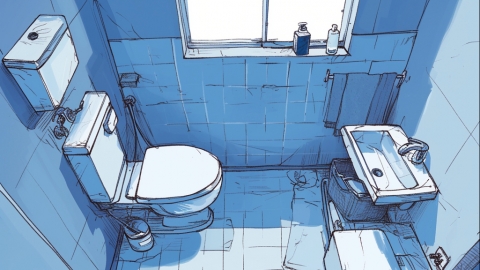What causes black stool?
Defecation refers to the process of passing stool. Black stool may be caused by dietary stimulation, medication effects, gastric ulcer, duodenal ulcer, acute erosive hemorrhagic gastritis, and other conditions. The appropriate management can be selected based on specific situations. If discomfort symptoms occur, it is recommended to seek medical attention promptly, clarify the condition, and follow medical advice for treatment to avoid delaying the illness.

1. Dietary Stimulation: Consuming large amounts of animal blood, such as duck or pig blood, or eating iron-rich foods like spinach and red dates, can lead to black stool. Iron in these foods combines with sulfides in the intestines to form black ferrous sulfide. Stool color usually returns to normal after stopping consumption of these foods.
2. Medication Effects: Taking bismuth preparations or iron-containing hematinic medications can cause black stool due to chemical reactions of these drug components in the intestines. If these medications are being taken as part of treatment, usually no special treatment is required; inform the doctor and continue medication as directed.
3. Gastric Ulcer: Helicobacter pylori infection or long-term use of nonsteroidal anti-inflammatory drugs may damage the gastric mucosa, forming ulcers that bleed. Blood from the ulcer site gets oxidized in the intestines, causing black stool. Symptoms often include upper abdominal pain, acid reflux, and belching. Patients may use medications such as omeprazole enteric-coated capsules, amoxicillin capsules, and clarithromycin capsules under medical guidance to promote healing.
4. Duodenal Ulcer: Excessive gastric acid secretion, Helicobacter pylori infection, and other factors may damage the duodenal mucosa, leading to ulcer bleeding. Blood passes out with stool, causing black stool, often accompanied by upper abdominal pain when fasting that is relieved after eating. It is recommended to use medications such as rabeprazole sodium enteric-coated tablets, colloidal bismuth pectin capsules, and metronidazole tablets under medical guidance to improve symptoms.
5. Acute Erosive Hemorrhagic Gastritis: Stress, drug irritation, alcohol consumption, and other factors may cause acute inflammation, erosion, and bleeding of the gastric mucosa. Blood mixing with feces can cause black stool, possibly accompanied by hematemesis and upper abdominal discomfort. Patients may follow medical advice to use medications such as hydrotalcite chewable tablets, sucralfate suspension, and pantoprazole sodium enteric-coated tablets to promote recovery.
In terms of diet, it is recommended to eat more foods rich in protein, various vitamins, minerals, and other nutrients to supply energy needed by the body and help maintain overall health. Engaging in appropriate activities such as slow walking, practicing Tai Chi, or yoga can also promote physical well-being.
References:
[1] Zhan Huiyin, Kuang Cuiqiong, Lai Jianyin. Clinical Effect of Compound Bismuth Aluminate Granules in the Treatment of Acute Erosive Hemorrhagic Gastritis[J]. Journal of Clinical Rational Drug Use, 2021, 14(22):72-74.
[2] Wang Yan, Song Jianguo, Li Hong, et al. Therapeutic Effect of Ranitidine Combined with Digestive Endoscopy on Duodenal Ulcer[J]. Chinese Medical Guide, 2024, 22(16):86-89.






